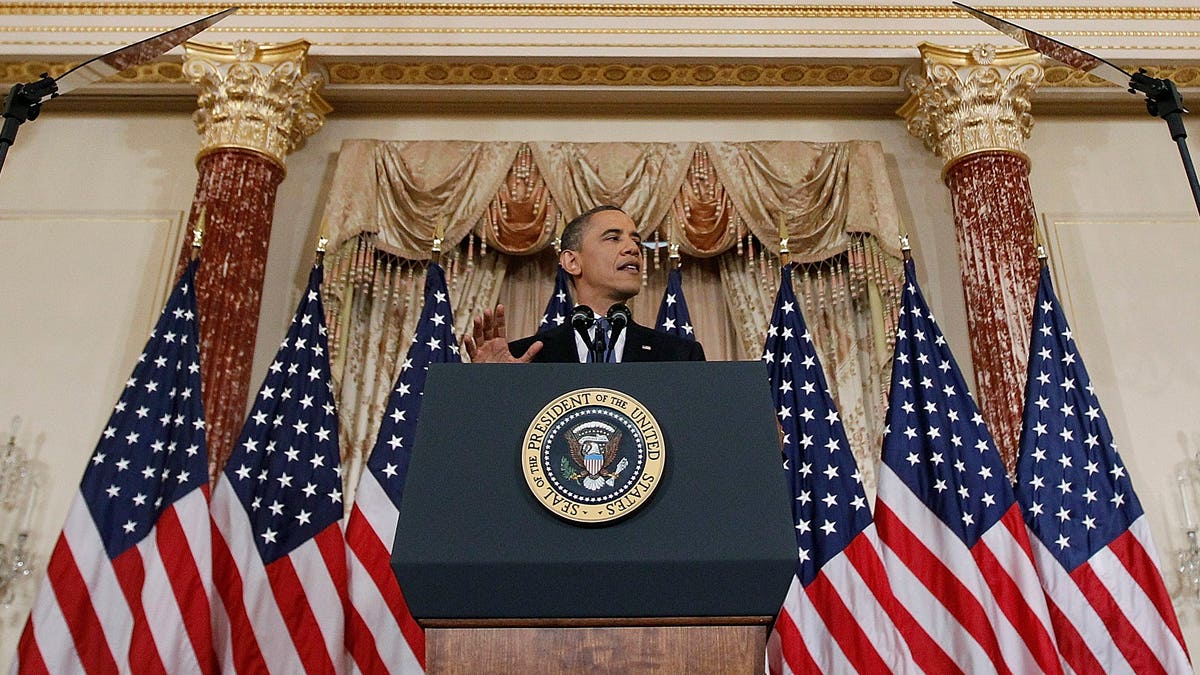
May 19: President Barack Obama delivers a policy address on events in the Middle East at the State Department in Washington. (AP)
President Obama's call for $2 billion in loan assistance to Egypt has left many political figures scratching their heads as they try to figure out why a debt-ridden U.S. would commit that much money to a country whose new government may not end up friendly to America.
In Thursday's sweeping address on the uprisings in the Middle East and North Africa, the president said he wants the U.S. to forgive roughly $1 billion in debt owed by Egypt and to provide another $1 billion in loan guarantees to free up money for job-creation efforts there.
"We do not want a democratic Egypt to be saddled by the debts of its past," Obama said. "So we will relieve a democratic Egypt of up to $1 billion in debt and work with our Egyptian partners to invest these resources to foster growth and entrepreneurship."
But with the U.S. grappling with more than $14 trillion in debt and lawmakers fighting over the terms for increasing the nation's own ability to borrow money, the president's call to help Egypt has face resistance in Congress.
"Considering our own national debt, we cannot afford to forgive up to $1 billion of Egypt's debt," said Rep. Elena Ros-Lehtinen, the chairwoman of the House Foreign Affairs Committee.
"I am deeply concerned that the president did not rule out providing aid to Egypt if the Muslim Brotherhood is part of the government," she said. "The U.S. should only provide assistance to Egypt after we know that Egypt's new government will not include the Muslim Brotherhood and will be democratic, pro-American and committed to abiding by peace agreements with Israel."
Former New Mexico Gov. Gary Johnson, who is running for president, posted this message on his Twitter account: "Pres. Obama: $2B in loan guarantees for Egypt'. Guaranteed with WHAT?? We're broke. Who will guarantee our guarantee??"
Sen. Tom Coburn, R-Okla, had a similar reaction.
"Where are we going to get $1 billion?" he told Dow Jones News Service. "If we give them $1 billion, we're going to borrow $400 million from the Chinese."
Sen. Dianne Feinstein, D-Calif., a senior member of the Senate Appropriations Committee, which would have to allocate the funds, told Dow Jones News Service, "I don't know where this money is going to come from. Two billion dollars, when everything is getting cut to the bone, is going to be difficult."
The White House says it is expecting broad international support for Egypt and Tunisia, the two nations seen as models while protests for freedoms elsewhere have been crushed. While uprisings in Egpyt and Tunisia led to dictators being toppled, protesters in Bahrain, Yemen, Syria and other nations have endured brutal setbacks
But officials say world leaders are not likely to emerge from next week's G-8 summit in France with a deal on a dollar amount for aid that would be sent to the North African countries as they embark on democratic transitions.
The interim prime ministers of both Tunisia and Egypt have been invited to the summit to present their plans for modernizing their economies to G-8 members. Obama says helping both countries with their short-term financial needs will be crucial as they move toward elections later this year.
Obama's trip to France is part of a four-country, six-day swing through Europe.




